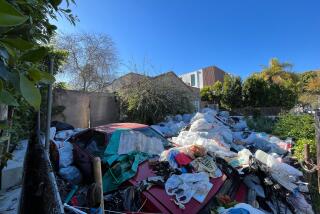Ways to Rid Your Neighborhood of Nuisances : Options range from calling the police to filing class-action lawsuits.
- Share via
Is there anything you don’t like about the neighborhood where your home is located? Consider yourself very fortunate if you can’t think of anything unfavorable.
But if something disturbs your quiet enjoyment, such as a nearby smelly factory, a hazardous property, a noisy business, a frequently barking dog, or perhaps a noisy airport, you may not have to tolerate that nuisance any longer if you know how to abate it.
Legal action can usually terminate or at least ameliorate the disturbing problem. In some situations you can take action individually. But other circumstances will require concerted action by you and your neighbors.
If the neighborhood nuisance that disturbs you affects only a few people, it is called a private nuisance. A neighbor’s all-night parties, trumpet playing at midnight, barking dog, or other disturbing noise that does not bother a large number of people are examples.
If the activity violates the law, then the police or other public authorities are the proper persons to stop the nuisance. However, if the private nuisance doesn’t involve a law violation, then your legal remedy is a lawsuit for an injunction to stop or limit the disturbing activity. Monetary damages, such as for the reduced value of your property due to the nuisance, also can be awarded.
Neighborhood Nuisance
For example, suppose your home is near a late-night bar where the rock band plays so loud that you can’t sleep. Although the bar may be in a commercial zone, the fact that it disturbs you and perhaps a few neighbors too, means you may be able to enjoin the noise or at least get a money award for the resulting loss of value to your home.
But the offending party may have a valid defense. These include: the plaintiff moved to the neighborhood knowing of the nuisance and the nuisance has been tolerated for a long time. However, generally invalid private nuisance defenses include that there are other nuisances in the vicinity, the property use doesn’t violate any law, and there was a use permit or statutory approval for the offending activity.
The other type of nuisance is a public nuisance, which affects a large number of people. Examples include a nearby dairy or cattle yard, smelly junkyard or dump, a noisy airport, an automobile or motorcycle race track or an activity that attracts crowds of noisy people.
There are several possible solutions to stop or modify a public nuisance. One is a lawsuit by a public official, such as the city attorney, against the offender. Just before election time is when public officials become most interested in nuisance abatement lawsuits.
Another remedy is a lawsuit by a harmed individual, but this is often beyond an individual’s financial means. Still another solution is a class-action lawsuit by all injured persons. Public-interest lawyers especially like such class actions because if they win, the legal fees can be large.
The requested relief from a public nuisance can be complete abatement, partial abatement, monetary damages or other settlement. For example, in response to airport noise abatement lawsuits, the airport often buys up adjoining homes or insulates them against noise.
After determining whether a private or public nuisance exists, the next step is to prove it to a judge or jury. Some activities, such as a house of prostitution are considered “nuisances per se” and will almost always be abated by a court. But proving to the court that a neighbor is a drug dealer may be far more difficult. Or it may be hard to prove that a smelly factory, which emits odors just on certain days, is a public or private nuisance.
Good of Community a Factor
Still another problem to ending nuisances is that courts are reluctant to abate nuisances that would cause massive economic problems, such as closing an offensive factory that employs hundreds of workers. Or ordering an outdoor movie theater to close just because a few neighbors object to noise and the traffic might not be considered good for the community.
Still another consideration in removing a neighborhood nuisance is the statute of limitations. Most states have a three- or four-year statute of limitations for private nuisances. That means if the offending activity has existed longer than the applicable statute of limitations, then it is like a prescriptive easement. But some courts hold the statute of limitations starts running again with each nuisance repetition. However, there is no statute of limitations for public nuisances.
Abating private or public nuisances can improve the quality of life in your neighborhood. But it may not be easy to prove the nuisance and to overcome defenses that the defendant may have. However, if a nuisance is preventing full enjoyment of your property, consulting a real estate attorney about abating the nuisance is suggested.
More to Read
Sign up for Essential California
The most important California stories and recommendations in your inbox every morning.
You may occasionally receive promotional content from the Los Angeles Times.













